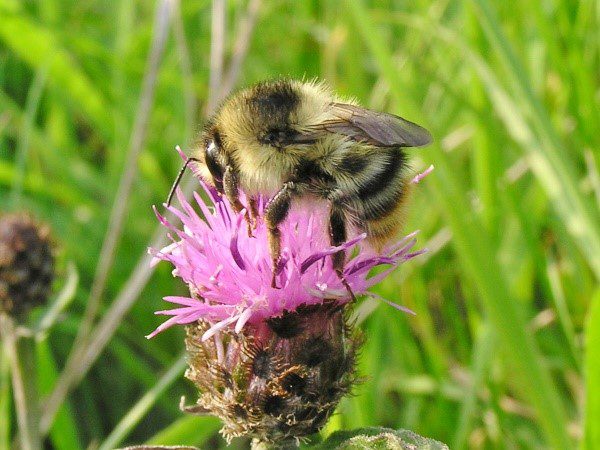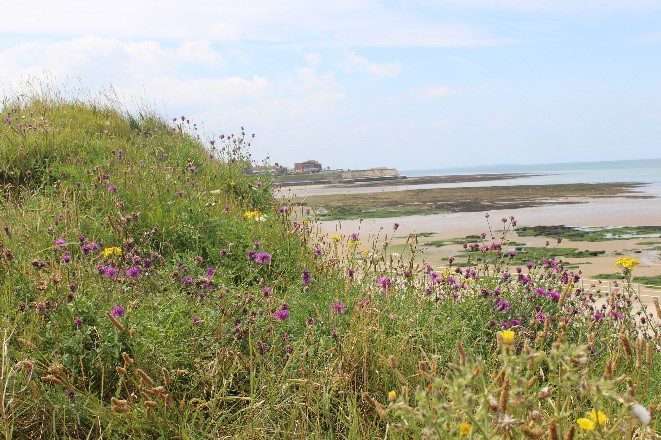Bees’ Needs Week: 8th – 14th July 2019

4th July 2019
Making a Buzz for the Coast
Midsummer time and the days are long. With the warm weather and mild evenings, bees are now at their busiest wherever there are flowering plants with nectar and pollen to be found. It’s the best time of year to get outdoors to watch and record the diversity of bees and pollinators that are so active now, and to carry out simple activities to help bees and other pollinators in your garden and local area.
Bees’ Needs Week celebrates the importance of bees and the other insect pollinators across the country. The aim of this special week is to draw attention to simple but effective action that everyone can take to promote the conservation of pollinators everywhere. The Bumblebee Conservation Trust is one of many national partners supporting Bees’ Needs Week, which is being hosted by the Department for Environment, Food and Rural Affairs (Defra).
At the core of the messages for Bees’ Needs week, there are five simple actions you can take to help pollinators and make sure their populations are sustained:
- Grow more flowers, shrubs and trees
- Let your garden grow wild
- Cut your grass less often
- Don’t disturb insect nest and hibernation spots
- Think carefully about whether to use pesticides
The importance of bees and other pollinating insects cannot be underestimated. Over 80% of wild plant species and about 70 % of fruit, vegetables and crops rely on insect pollinators, without which our ecosystems would lose many flowering plants and not function, and there would be serious food shortages. The most important of these are bees, and some plants rely entirely on bumblebee species and solitary bees for their flowers to be pollinated to produce fruit and seeds.
Challenges to bees. It is widely reported that over the second half of the 20th Century, insect diversity and numbers have experienced serious decline in the UK and worldwide. The causes of this decline are varied but include habitat loss, increased use of pesticides, more extreme climates and pests and diseases. Across this country, the 24 species of bumblebees and over 250 solitary bee species have similarly decline in overall numbers and in the range of many species, and 2 bumblebee species have become extinct in this period.
Bees in Kent. The ‘Garden of England’ holds a special place in the UK for its importance for bees. 22 of the 24 bumblebee species are recorded in Kent, including 5 of the 7 rare species. Kent has a long historical, economic and cultural association with horticulture and fruit growing. The warm dry climate and varied landscape of extensive grazing marshes, shingle, soft cliffs and sea walls, permanent grassland and chalk downland, ancient hedgerows, woodland and orchards, as well as brownfield sites and infrastructure land continue to provide important sites and flower-rich habitats for bees. Included amongst these is the Shrill carder bee (Bombus sylvarum), one of UK’s rarest bumblebee, a long-tongued bee with a high-pitch buzz (hence its name) still found in good numbers on certain sites on the north Kent coast. Brown-banded carder (B.humilis) and Moss carder bee (B. muscorum) are also recorded, as is the rare solitary bee sea aster mining bee (Colletes halophilus).
Shrill carder bumblebee. Photo credit: David and Holly Harries
Making a Buzz for the Coast project started in 2017, run by the Bumblebee Conservation Trust and is funded by the National Lottery Heritage Fund. Working closely with its partners Kent Wildlife Trust, RSPB, Natural England, Thames Water, Kent County Council, and Thanet District and Swale Borough Councils, the project covers the extensive areas of land along 135 miles of coast from Dartford to Deal. The project has 3 main themes:
Flower-rich grassland, Foreness. Photo credit: Dr Nikki Gammans, BBCT
Habitat creation, conservation and restoration for bees, including 5 focus sites; 15 Bee-roads on road verge nature reserves in Swale are being created and managed by KWT; providing free and bespoke advice to numerous landowners;
Monitoring populations. Data are needed to determine where best to put our efforts and to inform the land management advice we give. We are training and supporting people to carry out bumblebee surveys and to bumble hunt in their local areas as part of the BeeWalk citizen science scheme;
Buzzing Communities. We run a packed schedule of events, activities, competitions and free training courses. Through sharing knowledge we hope to raise awareness about the importance of bumblebees and pollination in Kent, build pride in the rare species present and most importantly, inspire people to take action to help. Activities to become involved in include Wild about Gardens volunteers being run by KWT and the Buzzing Gardens competition. One awareness celebration launched in June 2019 is the Making a Buzz Poetry Competition. People of all ages and all writing abilities are being encouraged to write poems of all types, celebrating the importance of bumblebees in Kent. To find out more, click on the poetry link above or on the Making a Buzz for the Coast link.
Written by Emma Lansdell, Project Manager, Making a Buzz for the Coast, June 2019
For more information and how to become more involved in our work, please contact mab@bumblebeeconservation.org
EK Note: If you love Bees as much as we do, do come along to the Kent County Show this weekend, 5th to the 7th July. At the KCC Year of Green Action Stand, Explore Kent will have a Pollinator Flowerbed display as well as information on how to make your gardens more Bee friendly.
You can also see the real thing at the Kent Honeybee Keepers’ Stand, where Bumblebee Conservation will be to answer any Bee related questions you have. There will also be the chance to purchase some delicious local Honey!
Popular articles
Walking the Pilgrims Way
Experience the beauty of walking across the Kent Downs NL through the…
Inspiring Pub Walks In Kent
With spring just around the corner, now is the ideal time to…
Walk Leader Volunteer Opportunity
Discover how you can become a walk leader in Medway! Uncover the…



